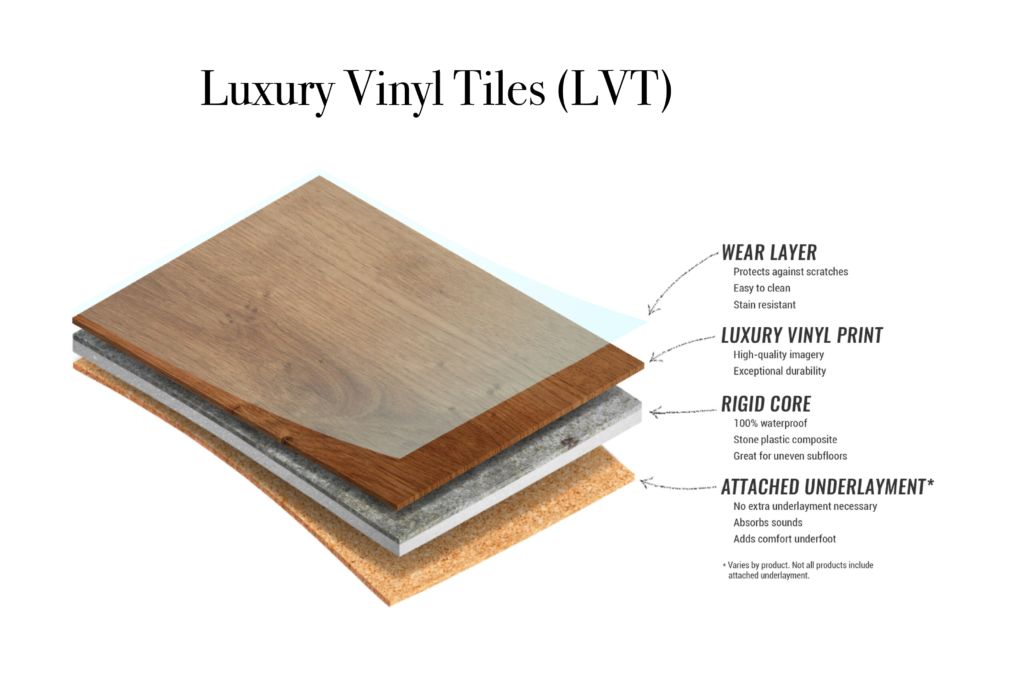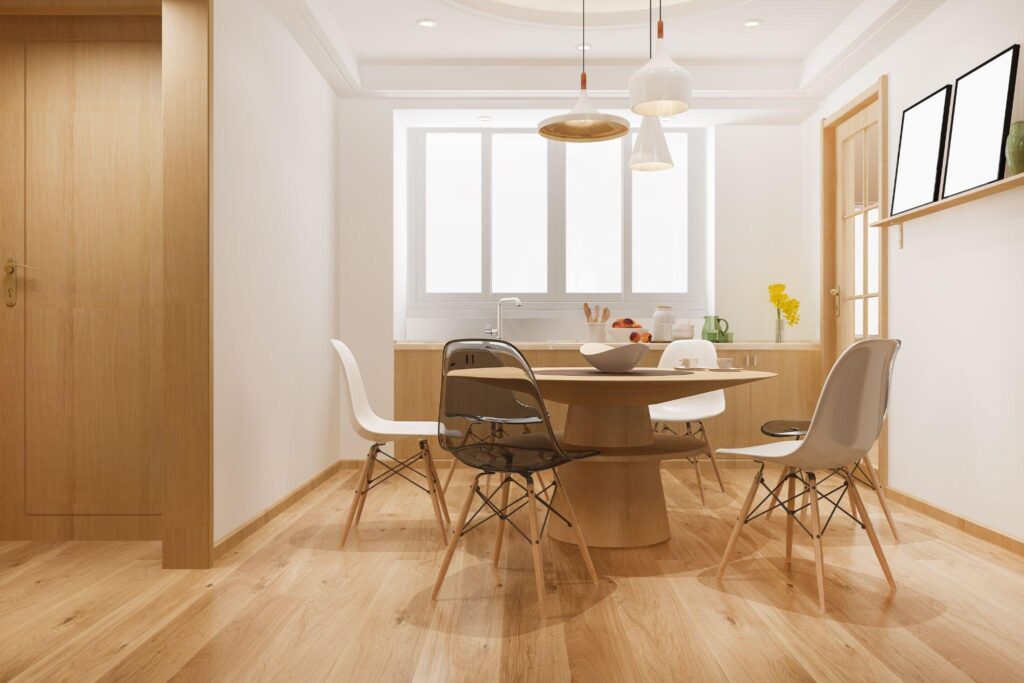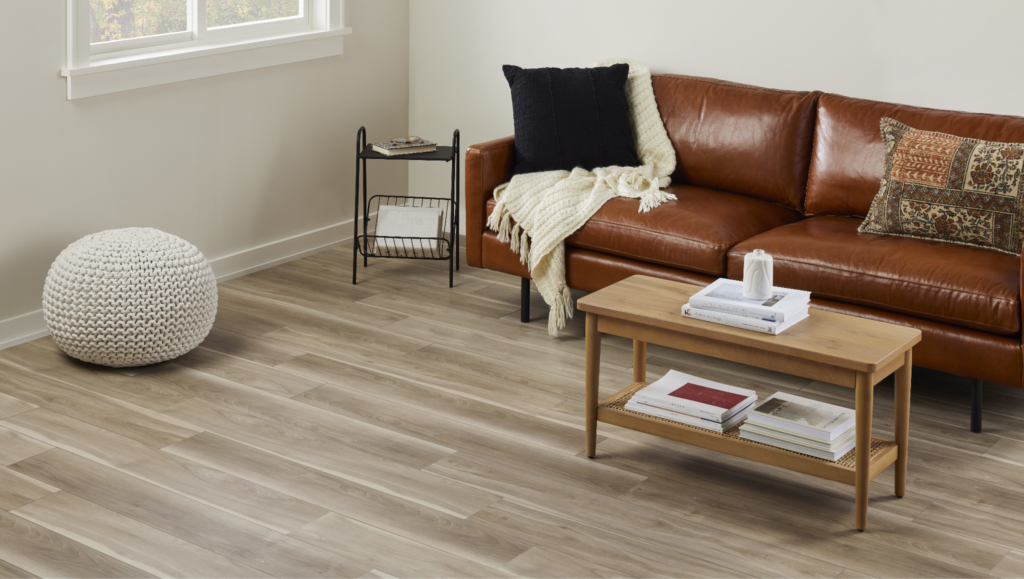
Vinyl and engineered wood are two popular flooring options, each with its strengths and weaknesses when it comes to the prevention of warping and swelling. Let’s delve into a detailed and in-depth comparison of these two types of flooring to help you make an informed decision.
Vinyl Flooring
Construction
Vinyl flooring is a synthetic flooring material made primarily from polyvinyl chloride (PVC) or other vinyl compounds. It is available in several variations, including luxury vinyl tile (LVT) and stone plastic composite (SPC). Vinyl flooring comes in a wide range of designs and styles, often mimicking the appearance of natural materials like wood, stone, or tile.
Water Resistance
One of the most significant advantages of vinyl flooring when it comes to preventing warping and swelling is its exceptional water resistance. Vinyl is virtually impermeable to water, which means it can withstand spills, moisture, and humidity without warping or swelling. This makes vinyl flooring an excellent choice for high-moisture areas such as bathrooms and kitchens.
Stability
Vinyl flooring is also known for its dimensional quality and stability. It does not contract or expand significantly with changes in temperature and humidity, which further contributes to its ability to resist warping and swelling. This makes vinyl an ideal option for areas with fluctuating humidity levels, as it remains relatively unaffected by such changes.
Installation
Vinyl flooring is typically installed using a floating method, where the individual planks or tiles are laid on top of the subfloor without being directly attached to it. This installation technique allows for some movement and flexibility, reducing the risk of warping due to environmental changes.
Durability
Luxury Vinyl flooring is highly durable and resistant to scratches, stains, and dents, making it suitable for high-traffic areas. It’s tough wear layer protects the surface from damage, enhancing its longevity.
Cost
Vinyl flooring is generally more affordable than many other flooring options, including engineered wood. Its budget-friendly nature combined with its water resistance and durability makes it an attractive choice for homeowners in Singapore looking for a practical and cost-effective flooring solution.
Engineered Wood Flooring
Construction
Engineered wood flooring consists of multiple layers of real wood veneers stacked on top of each other, with each layer running in different directions. This cross-grain construction provides greater dimensional stability compared to solid hardwood.
Water Resistance
While engineered wood is more water-resistant than solid hardwood, it is not as impervious to water as vinyl flooring. Engineered wood can handle small spills and minor moisture, but prolonged exposure to standing water or high humidity can cause it to swell and warp.
Stability
Engineered wood’s cross-grain construction gives it improved stability compared to solid hardwood. It is less prone to expansion and contraction with changes in temperature and humidity, reducing the risk of warping. However, it is essential to note that it still has some sensitivity to moisture.
Installation
Engineered wood flooring can be installed using various methods, including floating, gluing, or nailing down the planks. The installation method can impact its susceptibility to warping. Floating installations allow for slight movement, which can help prevent warping in environments with fluctuating humidity levels.
Durability
Engineered wood is generally more durable than solid hardwood due to its layered construction. It can withstand moderate foot traffic and can be refinished a few times, allowing for some longevity. However, compared to vinyl flooring, it may show signs of wear and tear more quickly.
Aesthetics
Engineered wood offers the natural beauty and warmth of real wood, making it an attractive option for those seeking the authentic look and feel of hardwood floors.
Choosing Between Vinyl and Engineered Wood
In summary, when it comes to preventing warping and swelling, vinyl flooring has a clear advantage over engineered wood due to its superior water resistance and dimensional stability. Vinyl is virtually impervious to water, making it an excellent choice for moisture-prone areas. It also has minimal expansion and contraction, ensuring that it remains relatively unaffected by changes in humidity.
On the other hand, engineered wood provides the aesthetic appeal of real wood and has better stability compared to solid hardwood. It can handle some moisture, but it is not as resilient to water exposure as vinyl.
Ultimately, the choice between vinyl and engineered wood flooring will depend on your specific needs and preferences. If you prioritize water resistance, easy maintenance, and budget-friendliness, vinyl flooring may be the better option. If you prefer the natural beauty of wood and are willing to take extra precautions to avoid excessive moisture, engineered wood can be a suitable choice. Consulting with a flooring specialist like Vinyl Flooring Singapore Ltd which offers cheap and affordable vinyl flooring help consider the conditions of the area where the flooring will be installed can help you make an informed decision that best suits your requirements.



